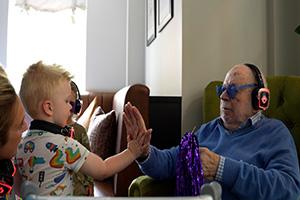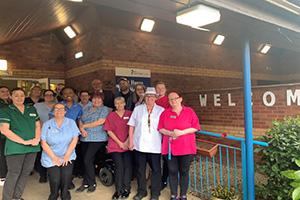Fears for wound care patients after COVID pandemic
- 88% of nurses fear that the COVID-19 pandemic has had a negative impact on the outcomes of those living with a wound[i]
- Research highlights that wound care patients are having mixed experiences of services across the country as a result of COVID-19 restrictions on care provision
- New report calls for collaborative approach between nurses and patients to rebuild wound care post-pandemic and support the 3.8 million people living with a chronic wound
Around 28% of patients are managing their own wounds due to the pandemic, according to a new report.[ii] One in fifty people in Britain – around 3.8 million - currently rely on wound care services, but variation in standards means patients are having mixed experiences of care across the country. The new report, published today, has been jointly produced by The Patients Association and Mölnlycke; it calls for action to ensure people living with a chronic wound are not forgotten by healthcare leaders in the service recovery, and that both patients and nurses are involved in discussions about wound care service redesign post-pandemic.
The report highlights the impact that chronic wounds can have on patients, both physically and mentally. It also reveals how many patients were forced to manage their own wounds throughout the pandemic, finding that while some had a level of confidence in doing this, a large proportion (30%) did not.[iii]
 Commenting on the report, Rachel Power, Chief Executive of The Patients Association said:
Commenting on the report, Rachel Power, Chief Executive of The Patients Association said:
“This report shows the impact the pandemic is having on patients who live with a chronic wound and need wound care services to stay well and active. In England, many of these patients have had to manage their own care or access support remotely. The report makes it clear that many found managing on their own hard.
“The brighter news is that some patients found they liked being in control of their own wound care, while still having the remote support of nurses. The report shows how important it is for healthcare professionals to work in partnership with patients to understand their needs. Practising patient partnership and shared decision making are the way to make wound care work for the 3.8 million people living with a chronic wound.”
The majority (88%) of nurses fear that COVID-19 has had a negative impact on wound care services as they struggle to cope with the pressures of the pandemic, such as staff being redeployed to other services. Eight out of ten nurses also expressed concern about the delays to seeing patients that COVID-19 has caused, which they worry are affecting patient outcomes.[iv]Sarah Gardner, Independent Tissue Viability Consultant, WoundMatters Ltd and Trustee of the Society of Tissue Viability:
“As we recover from the pandemic and consider how wound care services should be designed, we shouldn’t just assume that changes made in the middle of a crisis will remain suitable at all other times. Instead, we should take time to reflect on what worked well and not so well, have a conversation around what patients actually need, and then redesign services that are based on innovation, collaboration and patient partnership.”
The report calls for action to drive change in a way that works best for patients and staff, by listening to their experiences of the pandemic to bring positive innovation to wound care services.
Oliver Law, Business Director, Wound Care and UK&I General Manager at Mölnlycke said:
“Going back to business as usual is just not an option – wound care services were under strain before the pandemic hit. It is vital that as services rebuild in the wake of the pandemic that the voice of both patients and HCPs is heard – and Mölnlycke are committed to supporting this every step of the way.”
The report is the first part of a Mölnlycke project aimed at improving the provision of wound care services for both patients and those delivering care.





